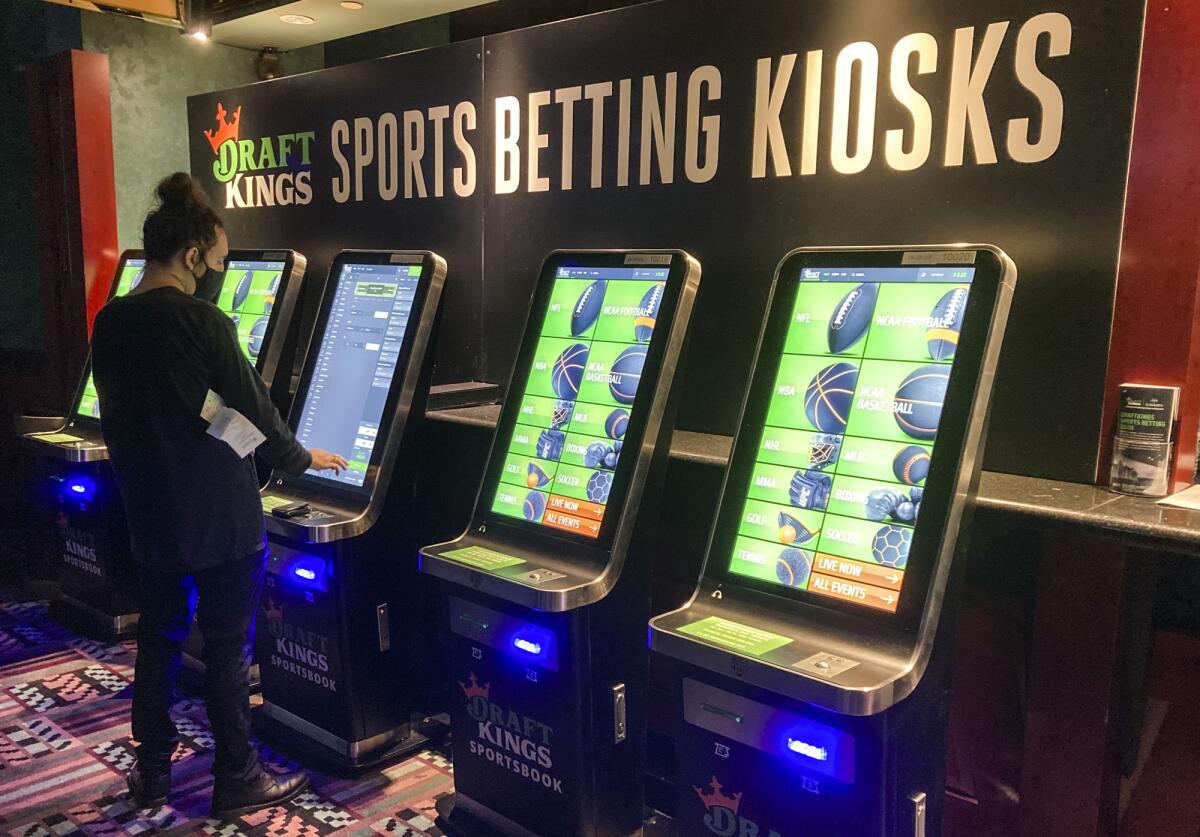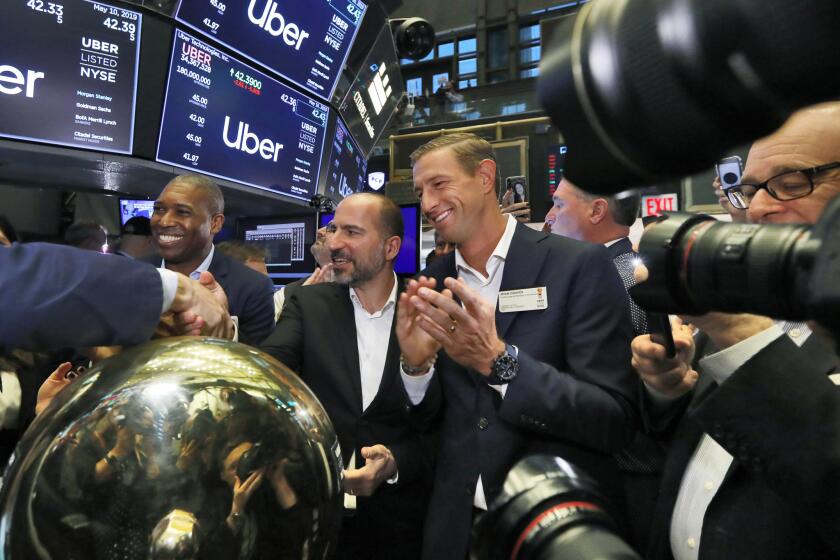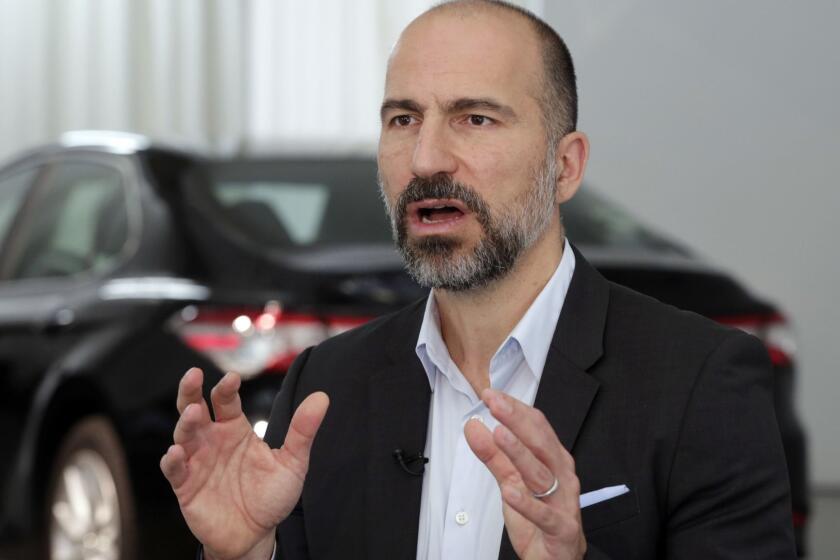Column: Proposition 27 backers say it will solve homelessness by enabling sports gambling. Don’t bet on it

California ballot initiative campaigns have long since turned into founts of misinformation and lies purveyed by self-interested promoters.
But it may be hard to outdo the sheer cynicism underlying one measure on the November ballot. That’s Proposition 27, which aims to vastly expand gambling in the state by masquerading chiefly as a solution to homelessness.
Let’s not mince words: This initiative, which would amend the state Constitution, is poisonous in several ways. Wise voters will steer clear. It’s bad for the state’s fiscal health and bad for public health, and it’s being sold through a spectacularly misleading advertising campaign.
Internet-based gambling is increasingly being viewed as a conduit for problem gambling.
— Gambling experts Ken C. Winters and Jeffrey L. Derevensky
Proposition 27 would open California to online sports betting, a highly addictive form of gambling.
Although the state Legislative Analyst’s Office estimates that it could produce as much as $500 million a year in state revenue, that sum isn’t guaranteed. In any event, the measure would sequester most of it in a fund for homelessness projects and for gambling addiction programs — thereby claiming to address a problem of its own making.
Get the latest from Michael Hiltzik
Commentary on economics and more from a Pulitzer Prize winner.
You may occasionally receive promotional content from the Los Angeles Times.
The public face of the Proposition 27 campaign is a group of Indian tribes that have been largely shut out of the billions in riches collected at major Indian casinos owned by tribes located close to large metropolitan areas or on well-traveled freeway corridors.
Its promoters, however, are actually seven gambling firms — DraftKings, FanDuel, BetMGM, FBG Enterprises (brand name Fanatics), WSI (the company formerly associated with Steve Wynn), Bally’s Interactive and Penn Interactive — that have put up $150 million, so far, to fund their ad campaign. The tribes featured front and center in the Proposition 27 ads haven’t contributed even a dime.
To the big gaming companies, Proposition 27 is preferable to Proposition 26, the competing measure sponsored by tribes with casinos.
That initiative would legalize sports betting but restrict it to in-person betting at tribal casinos and four racetracks. It would also expand the allowable games at the tribal casinos to include roulette and dice games such as craps.
Unlike Proposition 27, this alternative measure’s revenues would largely be available to address any state priorities.
If both measures pass, the one with the higher vote will become law.
Proposition 22 is a revolutionary step in the influence of tech-based businesses in our daily lives in general and the lives of workers in particular.
Fasten your seat belts: This battle is sure to become the most expensive in American history. In addition to the $150 million raised for Proposition 27, casino-owning tribes have contributed $92 million to defeat it and support Proposition 26.
Some tribes have donated $66 million merely to oppose Proposition 27, and nontribal cardrooms have donated $41 million to oppose Proposition 26, which would cut deeply into their own franchises.
The total thus far of about $360 million already surpasses the more than $204 million spent by Uber, Lyft and other gig companies in their successful campaign to pass Proposition 22, the 2020 measure exempting them from a state labor law classifying their drivers and delivery workers as employees. (Opponents spent $20 million.) And we’re not even at Labor Day yet.
If you’ve spent even 10 minutes in front of the television set this summer, you’ve probably seen the Yes on 27 commercials declaring that the initiative would fund “permanent solutions to homelessness, mental health and addiction in California.”
Homelessness is certainly a major crisis in the state. “Homelessness advocates, big-city mayors say that permanent solutions to homelessness need ongoing money for health services, addiction treatment services, and job training, they need a permanent funding source,” says Nathan Click, spokesman for the Proposition 27 campaign.
Solving homelessness and those other pathologies is a pretty tall order, and if Proposition 27 were the solution, it would deserve overwhelming support. But it’s not; more on that in a moment.
I’m sure the gambling firms are all public-spirited in their way, but do you really think they care about the crisis of homelessness in California as opposed to drinking deeply of the potential profits from online gambling in the vast California market? Me neither.
The non-gaming tribes supporting the initiative also mention homelessness funding, but their stance is entirely consistent with a desire to get in on the lucrative casino gambling market that the richer tribes have monopolized.
There shouldn’t be any mystery to why the gaming companies are so interested in California, specifically through Proposition 27. California is the biggest potential gambling market in the nation. Perhaps more important, online gambling is the holy grail in the sports betting industry.
The Proposition 22 ballot campaign by Uber and Lyft just became the most expensive such campaign ever.
Most of the companies backing the ballot measure are losing money, in part because they’re competing with one another, but also because the brick-and-mortar gambling market may be reaching the saturation point. Legalizing online sports betting opens up a whole new market, which the companies hope will finally move them all into the black.
Now let’s consider the social implications of Propositions 27 and 26. Start with sports betting generally.
Gambling experts have found that problem gambling rates are markedly higher in sports betting than other forms of gambling. In part that’s because sports gamblers tend to perceive their gaming as subject to their own skills rather than simply luck.
More troubling, “internet-based gambling is increasingly being viewed as a conduit for problem gambling,” according to a survey by researchers at McGill University and the Oregon Research Institute. Given the easy availability of digital devices — tablets, laptops, smartphones — one can see how it can be hard to get the online gambling monkey off one’s back.
Another exacerbating factor identified by researchers is in-play live-action betting, of the sort offered by several of the firms backing Proposition 27. This format feeds impulsive behavior and encourages players to “chase” returns, which is “common among problem and disordered gamblers,” the survey authors wrote.
Despite those red flags, sports gambling has exploded coast to coast; 36 states and the District of Columbia have legalized it in one form or another since a 2018 Supreme Court decision that overturned a federal ban. Betting is up and operating in 30 of those states and D.C., and not yet launched in the other six.
The pro sports leagues have joined the parade, after decades in which they shunned sports betting like a plague. As my colleagues Ryan Faughnder and Stephen Battaglio reported last year, the leagues see betting as a way to keep their core audience of young men interested in games outside their home markets.
The NFL, accordingly, has signed deals with seven gambling firms, the only ones it permits to advertise on game telecasts. And Major League Baseball is an explicit supporter of Proposition 27; the league says it endorsed the measure because of the “strong integrity provisions” written into the regulatory language.
I asked the league how its stance conformed with its historical distaste for gambling, which includes the lawsuit it filed with other sports leagues to block New Jersey’s legalization of sports betting in 2012, its lifetime ban of superstar Pete Rose in 1989 for betting on games, and the precedent set in 1920 by Judge Kenesaw Mountain Landis’ banning of eight White Sox players for throwing the 1919 World Series at the behest of a gambler.
MLB didn’t respond.
Proposition 27 would deliver revenue to the state in several different ways, according to the eyeball-glazing 65-page text. The online gambling companies would have to pay one-time fees of $100 million each for their first five-year license and $10 million for each five-year renewal. Tribes would pay $10 million for their first five-year license and $1 million per renewal.
Some cautioned that the recall and initiatives would become playthings of the powerful. That’s what’s happened.
The gambling firms would have to partner with a tribe to operate in California; the tribes could operate gaming on their own, but that’s considered implausible given the complexity of the gambling business.
The tribes and gambling companies would pay 10% of their gross gambling revenues to the state, after subtracting payouts to customers. That’s a lower percentage than at least 12 of the other sports gaming states charge. It’s also subject to some exemptions, including bets made with free promotional credits and federal gambling taxes.
Of the revenues flowing to the state, 85% would have to be used for homelessness programs and mental health programs, and 15% would go to a fund for the non-gaming tribes. (Those tribes already split about $67 million a year from the gaming tribes. Click says the additional funding from the initiative could equal that amount.) The money, however, would also be used to pay for the new state regulatory agency created to oversee the online sports gambling industry.
What it can’t be used for is any other state purpose. This is one of the principal flaws in the measure, because it hamstrings the ability of the Legislature and governor to address any other state priorities.
Global warming, sea-level rise, water scarcity, electricity generation, earthquake or other disaster recovery, K-12 and college funding — they’ll all stand in line behind homelessness and mental health, in perpetuity. We elect legislators and the governor to make judgments about spending priorities. Permanently preventing them from doing so on hundreds of millions of dollars a year in revenue is senseless.
The mental health funding, incidentally, is specifically designated for gambling addiction programs. Proposition 27 would be paying to solve a problem it’s creating; that’s the sort of progress evoked by a truck spinning its wheels in mud.
Will Proposition 27 funding really make a difference for the homeless? That’s questionable. The Newsom administration has budgeted a record $12 billion over two years for homelessness programs. The funding from the ballot initiative would add about 4% to that sum.
Solving the homelessness crisis isn’t a matter of an incremental addition to the funding; if money were the main issue, the problem would be closer to a solution. Homelessness persists because there’s little agreement on how the money can be best spent.
Homelessness results from a spectrum of causes, not all of which manifest themselves on the streets — drug abuse, psychopathologies, poverty, inaccessible healthcare, not to mention a shortage of affordable living units.
The potential solutions are every bit as variegated and are all the subjects of vigorous professional debate. Proposition 27 contributes nothing to the roster of solutions, beyond a prohibition on using more than 40% of the homelessness fund on temporary housing.
One would hope that experience had immunized California voters against initiative promoters’ buoyant pledges of “solutions,” but apparently not — as recently as 2020, voters agreed to gift the state’s stem cell program with another $5.5 billion on top of its original funding of $3 billion, despite the program’s inability thus far to develop the “cures” to a universe of diseases that were promised by the drafters of the original initiative in 2004.
Whatever your moral stance is on gambling generally, you should be thinking about whether we already have enough to sate even the most voracious appetite. The homelessness crisis, which happens to be top of mind among voters at the moment, is merely the glittering object the gambling industry is using to distract from its true goal.
If it were really solvable by an infusion of cash, think about how much good could be done with the $360 million the gambling industry has raised so far to get its hands deeper into your pockets.
More to Read
Get the latest from Michael Hiltzik
Commentary on economics and more from a Pulitzer Prize winner.
You may occasionally receive promotional content from the Los Angeles Times.














